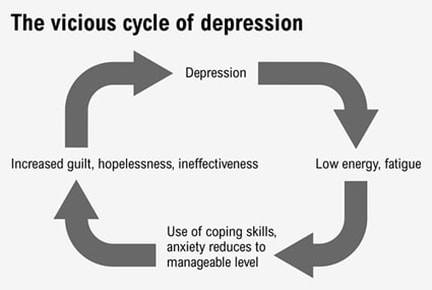|
1 in 7 Australians will experience depression in their lifetime..... Depression is not "feeling sad". Depression is vastly different from the normal emotional experience of feeling sad. People feel sad for all kinds of typical reasons; an argument with a loved one, failing an assessment, being left out of a group, losing your job. These experiences can make you feel sad. With time, though, your sad feelings resolve themselves and you find different ways to understand, manage and cope with the feelings. Depression is different and just changing your circumstances won’t necessarily alleviate the symptoms. Don;t get me wrong, making changes can certainly help, but depression can be complicated and can take some time and effort to understand and heal from. Depression is marked by persistent feelings of sadness. If your feelings of sadness linger for more than two weeks at a time with no reprieve, the emotions interfere in your normal activities, lifestyle, wellbeing, and ability to maintain your day to day routine. This could be an indicator that you require additional support to understand what is happening and begin the healing journey. Depression commonly impacts the way you think and, in turn, what you believe to be true about your reality and the world you live in. It can set you up with an expectation of a negative outcome and can create your perceived reality through a set of very dark and hopeless lenses.
For example, people sometimes describe waking up each day with a pervasive feeling that the day will be bad, there is no point making an effort, and feeling like there is nothing to look forward to. The mindset can be very negative and these thoughts can very easily suck any positivity, joy, hope or happiness from the mood. And because the depression is focused on all the things that are bad and negative, it can be very difficult to see the good. Self-talk can be considered empowering or disempowering. The thoughts we are having at any moment can help us step in the right direction for positive growth or alternatively, shrink and wither away from the world and any hope you have. Becoming aware of your self-talk is a crucial step to healing from depression. Learning to become conscious and observe our cognitions and meta-cognitions (thoughts), how these make us feel and understanding them is part of the journey toward freedom from depression. What are you saying to yourself? Allow yourself to pause for a moment and tune in so that you can begin to build awareness. Questions to Consider:
If you are living with depression, you might feel that doing the simplest of tasks is unachievable. A therapist can help break these goals down, support you in your recovery, and help you learn to manage the experience of depression. Do you remember the last time that you were happy? What’s something that you use to do that made you happy? What is your favourite food, scent, memory? Try to expand your mind to recall these pleasures and have a think about beginning to implement these. If you are living with depression you may also struggle to feel motivated. Just remember that it’s not realistic to feel motivate every single day, motivation can wax and wane, however focusing on changing one thing at a time can get the ball rolling. I always encourage sufferers to start with ONE "non-negotiable" like eating regular, nutritious meals or snacks, showering, brushing teeth, making human contact, fresh air and a little activity. Taking it slowly, developing confidence and consistency and allowing those small steps to become larger ones until a path toward recovery becomes apparent. Sometimes you will feel as if you must go against your brain! Don’t want to get out of bed? Do it anyway. By doing this, you are fighting the resistance, doing something you KNOW your body needs, and training your brain to develop a habit. When your brain gets comfortable (like staying in bed all day), it will resist any new task that you are trying to introduce. It simply does not like change. By attempting to shift your unwanted patterns, working hard to develop consistency, your brain will adapt and your new behaviours will replace the old unhelpful ones. Try to separate yourself from depression, depression may be affecting you but you are not your depression. It can be difficult to separate yourself from the symptoms and sometimes people begin to believe that "this is just me, destined to be like this forever". Depression is a serious mental health care condition and often therapy is required to learn to manage and live well again. If you suspect you have developed, or are at risk of developing, depression, please do not hesitate to contact your GP or a psychologist. Psychologists have at least six years of mental health training and have copious ways of understanding and treating the symptoms of depression. Written by Rebecca Pearce, Psychologist.
0 Comments
Your comment will be posted after it is approved.
Leave a Reply. |
Categories
All
|

